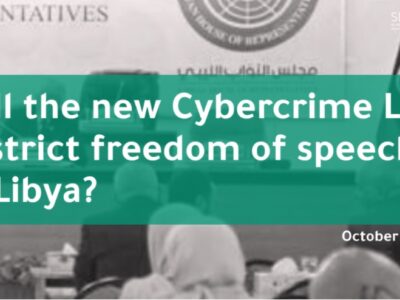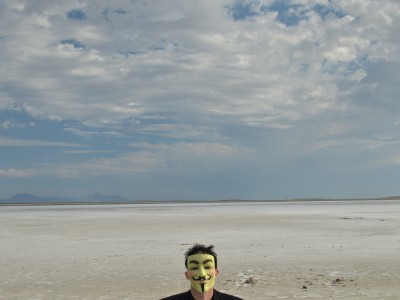
Libyans in central Tripoli protest the continuing presence of armed groups in 2011. Photo by Maghrebia via Wikimedia (CC BY 2.0)
The Advox Netizen Report offers an international snapshot of challenges, victories, and emerging trends in Internet rights around the world.
Earlier this week, Facebook was blocked in the Libyan capital Tripoli and surrounding cities, as fighting between armed militias raged. On 3 September, Reuters reported that the blocking started around noon local time, and that while residents were able to access other websites, Facebook was inaccessible.
It remains unclear who blocked the social media platform and for what reasons. Al Jazeera reported that the state-owned Libyan Post, Telecommunication and Information Technology Company, which owns the country’s only two internet providers, said “a lack of security had led to outages” but did not directly address the blocking of Facebook.
Like elsewhere in the region, Facebook is by far the most popular social media platform in the sparsely populated country of six million people. While Facebook played a key role in 2011 to mobilize protests against the regime of now-deceased dictator Muammar Gaddafi, different armed groups vying for control have since been using the platform to find, threaten and silence critics and opponents, engage in hate speech and other illegal activities such as arms and human trafficking. A recent investigation by The New York Times showed that “practically every armed group in Libya” had its own Facebook page.
The New York Times found evidence of military-grade weapons being openly traded, despite the company’s policies forbidding such commerce. Human traffickers advertise their success in helping illegal migrants reach Europe by sea, and use their pages to drum up more business.
Saudi Arabia says no to online satire
Public prosecutors in Saudi Arabia announced via Twitter on September 3 that online speech that “ridicules, mocks, provokes and disrupts public order, religious values and public morals through social media” will be criminalized, in what would likely be an amendment to an already existing cybercrime law. This will amount to a ban on political satire in the kingdom, and provide authorities with an additional legal mechanism for silencing critical speech.
The country’s cybercrime law has been used to criminalize political speech multiple times, including in the prominent case of Israa Al-Ghomgham, an activist who has been in detention for more than three years on charges related to her online activism during and after the Arab uprisings of 2011-12. Prosecutors are now seeking the death penalty against Al-Ghomgham, whose next court appearance will be in October.
After he “shit on God”, Spanish actor refuses to appear in court
A popular actor is facing detention in Spain over a July 2017 Facebook comment that read: “I shit on God and there's shit leftover to shit on the holiness and the virginity of the Virgin Mary.” The Spanish Association of Christian Lawyers filed a complaint arguing that the comment offended religious sentiments, despite the fact that “I shit on God” is a common exclamation in Spain. After the complaint was filed, Willy Toledo refused to appear in court on two occasions, at which point the judge in his case ordered his arrest. #MeCagoEnDios (#IShitOnGod) rose to the number one trending topic on Twitter in Spain, tweeted mainly by users showing solidarity with Toledo.
WhatsApp remains under fire in India
An inter-ministerial committee in India is developing a set of recommendations intended to quell the spread of disinformation in the country, which in multiple cases has escalated to real-life violence, in particular in the form of lynch mobs. Although Facebook and WhatsApp appear to be prime targets of government leaders who are part of the committee, many in India say that vicious party politics lie at the root of the problem.
China's chasing fake news, too
A new state-run platform, Piyao, is now centralizing efforts to stop online “rumors” in China, where any piece of information that does not come from official government channels can be considered a rumor. Hosted by the Central Cyberspace Affairs Commission and operated by the official Xinhua news, Piayao has integrated data from 40 other rumor report platforms and generated a rumor database with 30,000 incidents. It encourages the public to file reports, but also uses artificial intelligence to identify rumors spreading online.
Five eyes seek stronger snooping powers over encrypted communications
United States, Britain, Australia, New Zealand and Canada — the so-called Five Eyes nations — issued a memo in late August 2018 that pressures private technology companies and developers to make encrypted communications accessible to law enforcement authorities. Much of the language in the memo is remarkably general and vague, but the final sentence makes it clear what these governments want:
Should governments continue to encounter impediments to lawful access to information necessary to aid the protection of the citizens of our countries, we may pursue technological, enforcement, legislative or other measures to achieve lawful access solutions.
New research
- Gender and community networks: Researching social and gender impact - Nic Bidwell/Association for Progressive Communications
Subscribe to the Netizen Report
Afef Abrougui, Ellery Roberts Biddle, Mohamed ElGohary, L. Finch, Rohith Jyothish, Leila Nachawati, Georgia Popplewell and Sarah Myers West contributed to this report.



